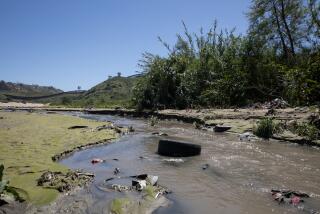Sewage, Surfer Health Link Studied
- Share via
A Long Beach doctor, with the help of the Surfrider Foundation, is conducting a study of Huntington Beach surfers to determine if frequent ocean users there have a greater risk of contracting hepatitis A, a virus that flourishes in polluted waters.
Officials with Surfrider, an environmental group, said they hope the research will add scientific muscle to their fight to stop the Orange County Sanitation District’s practice of releasing 245 million gallons of treated sewage--half of which is processed below federal standards--every day four miles off the Huntington Beach coast.
Dr. Aaron Gloskowski said no one has studied the potential for illness from the sewage plume, adding, “We really don’t know yet” whether the sewage has an adverse effect on ocean users’ health.
Nor will this study prove it, sanitation officials said, because even if ocean users have higher rates of hepatitis A, that doesn’t necessarily mean the disease came from the sewage plume.
Results of the research, which fulfills a requirement for Gloskowski’s third-year residency program, will be announced within two weeks.
The district is scheduled to decide this summer whether to seek renewal of a federal waiver that allows it to treat half of the waste water it pumps into the ocean at levels less than those adopted by most of the nation’s 16,000 sanitation districts. Its waiver expires next year.
“We’re hoping to get information that will help us prove to them that their plan is really detrimental to the public,” said Lisa Brooks, chairwoman of the Surfrider Foundation’s Huntington Beach/Seal Beach chapter. “They always say [the sewage] is out far enough that it’s not hurting anyone. But for a long time, people have told us they are getting sick.”
The state Assembly last month passed a bill that would block the district from getting the federal standards waived.
The proposal is being debated by state senators.
In recent years, the Huntington Beach coastline has been plagued by high bacteria counts. A $5-million sanitation district study released last month did not find a definitive source.
District spokeswoman Sonja Wassgren said that even if surfers have contracted the hepatitis virus, it’s still impossible to identify the source. Urban runoff, a nearby marsh, leaky sewer pipes or the district’s offshore sewage plume are all possible culprits.
“It’s pretty hard to quantify,” Wassgren said.
Gloskowski, whose regular surf spots include Huntington Beach and Newport Beach, will complete his residency program in family medicine at Pacific Hospital of Long Beach this month.
A member of the Surfrider Foundation, he had often heard about the nonprofit’s efforts to determine the effects of polluted water on surfers’ health. And that seemed a perfect subject for his final research study required as a resident doctor.
Last weekend, 40 surfers, most still wet from the ocean, had their blood drawn at the Huntington Beach Pier to see if they were more likely to have hepatitis A antibodies than a control group of landlubbers.
The virus, found in fecal matter, produces flu-like symptoms and often goes undiagnosed. That makes it difficult for clean-water advocates like Surfrider to link pollution to health problems.
Until now, surveys taken at the beach or in surf shops along with anecdotal evidence were the primary methods Surfrider and others used to track ocean-related illnesses.
More to Read
Sign up for Essential California
The most important California stories and recommendations in your inbox every morning.
You may occasionally receive promotional content from the Los Angeles Times.










